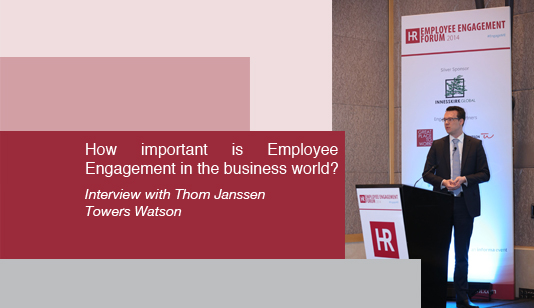How important is Employee Engagement in the business world?
Interview withThom Janssen
Senior HR Consultant / Practice Leader at Towers Watson
In modern management, employees remain in the core of any strategic development of companies. To talk about the issue of Employee Engagement and its importance in advancing businesses, Middle East Business had the pleasure to have an interesting conversation with Mr Thom Janssen, who is a Practice Leader, Organisational Surveys and Insights specialist at Towers Watson in Dubai and Expert in Employee Engagement Studies, responsible for business development and the management of the Engagement / Organisational Insights practice in the Middle East.
- Can you tell us a little bit about yourself?
I was brought up in a small village in The Netherlands but have lived in 7 countries over the last 15 years. I have always worked in a research environment and particularly in Engagement. Employee Psychology is such a complex and intriguing field which is continuously developing and poses us, me, with the challenge to continue to learn about it and align strategies accordingly. I find my work particularly rewarding as we support companies to invest in employees so they are happy and engaged to perform at their best.
- Why is it so important for decision makers and business people to link survey results with their action plans?
Organisations use surveys as a channel to understand the sentiments of employees. In addition surveys will provide a ‘health-check’ in terms of direction, performance and sustainability of the business. Understanding is only the first step; just measuring these parameters will not change things. It is the follow-up process, where action plans are developed on the key priority areas from the survey results, that will impact business performance going forward.
- In the case where this procedure is not taken into consideration what might the company or organisation risk?
Naturally, the obvious risk for any organisation that does not action the survey results is that the organisation is not performing at its optimum level, whether it is due to loss of employee performance or business alignment and efficiency.
A secondary point that often gets overlooked is that employees are taking the effort to share their opinions and do so with the expectation that their voice is heard and taken seriously. If management is not seen to follow-up on the survey, then there is no incentive for employees to participate in new initiatives.
- You have worked in many European countries, and now in Dubai. How do you evaluate the community culture influence on employee engagement in their business surroundings?
I have worked with large global organisations and with small local firms in primarily England, Germany, Netherlands, Spain and now across the Middle East. I find that employees from different geographic locations and cultures answer in different ways and it is particularly interesting here in the Middle East to understand what drives employees from different nationalities as the Middle East has such a diverse workforce and creating a corporate culture is very difficult. Some key business differentials such as ‘efficiency’ are less affected by culture and can be aligned more easily on a global level.
- Many companies are family businesses in the Arab world and in particular in the Gulf countries. What advice would you give them in order to keep their employees motivated, specially that many of them are relatives?
I find that Engagement is even more important for family businesses; we often see that due to the family nature of the business there is more challenge to communicate openly and recognise imperfections. A survey is a great tool to collect valuable insights in a secure, confidential and non-confronting environment. Towers Watson also provides leading market data which benchmarks survey results to peer organisations and thus providing a neutral, third-party assessment on what the key priority areas are for family businesses. This way we keep all stakeholders on the same side of the line moving to a common goal of improving business performance.
- What should companies do in order to optimise employee engagement the highest possible and to insure effective results?
In our experience ‘Culture eats Strategy for breakfast’ every day. Strategies can be copied, software can be bought but culture is unique to each organisation. That is why regularly running an Engagement Survey provides you with vital insights on how the corporate culture is developing and whether it is supporting to the strategic agenda of the organisation.
- What is the importance of the research for small enterprises as most of the Arab enterprises are SME’s and in some cases cannot afford the expenses of conducting a market research?
As with family business, SME’s with smaller number of employees (<200), often approach us with the request to run a survey nonetheless because of the sense of confidentiality it provides to employees. For SME’s on a budget we offer the alternative of running Focus Groups and 1-2-1 interviews which provide in-depth qualitative data and combined with our market experience we can still provide recommendations versus best practices. This approach also serves as a great communication tool.
- You have a pragmatic style in management, can you explain that?
Any theory whether it be on ‘Engagement’, ‘Employee Value Proposition’ or ‘Organisational Health’ is only as effective as the implementation plan that gives it operational traction. I have a very practical approach to business and I always say to prospective clients that if they are not ready to commit to the follow-up process then they should not do the survey at all. I guess the stereotype of Dutch people saying things ‘straight-up’ is true for my case and I find clients appreciate the open honesty and it helps overcome some of the political barriers in board meetings.
- Last word, what is your advice to companies who wants to expand into other markets in the Middle East?
I believe expanding to markets in the Middle East is no different than moving to different markets in Europe or US. First and foremost, you need to understand the market and appreciate that what works in one country may not work in another. Aside from legislation and processes, every organisation needs a strong workforce and the only way to achieve this is by listening to and investing in your employees.
- What was the nature of your participation in the HR Employee Engagement Forum?
It is important for organisations to realise that there is a bigger picture beyond employee engagement which combines employee programmes under one common “Employee Value Proposition” which in turn supports an organisation to communicate and advertise their HR programmes in a consistent manner. The benefits are that employers with a clearly defined EVP are more effective at Attracting, Engaging and Retaining employees.




























